Diction
dict的词根词缀

"dict" 是一个词根,通常表示"说" 或"讲" 的意思。
它源自拉丁语"dictum",意思是"说" 或"言论"。
在英语中,我们可以找到一些单词和词缀,使用了这个词根"dict",表示不同的意思和概念。
以下是一些与"dict" 有关的常见词汇和词缀:Dictionary(词典):这个词是由"dict" 和"ionary"(表示"相关的")组成的,表示一个包含词汇和其定义的书。
Dictate(口述):这个词由"dict" 和"ate"(表示动作或过程)组成,表示口头陈述或指导。
Dictator(独裁者):这个词由"dict" 和"ator"(表示人或事物)组成,表示一个具有独裁权力的领导者。
Verdict(裁决):这个词由"ver"(表示"真相")和"dict" 组成,表示法院的判决或决定。
Predict(预测):这个词由"pre"(表示"前")和"dict" 组成,表示在事件发生前预先说出或预测。
Indict(起诉):这个词由"in"(表示"不")和"dict" 组成,表示正式起诉某人或某事。
Diction(措辞):这个词由"dict" 和"ion"(表示"状态或性质")组成,表示措辞或用词的方式。
Interdict(禁止):这个词由"inter"(表示"之间")和"dict" 组成,表示禁止或阻止某事。
diction修辞
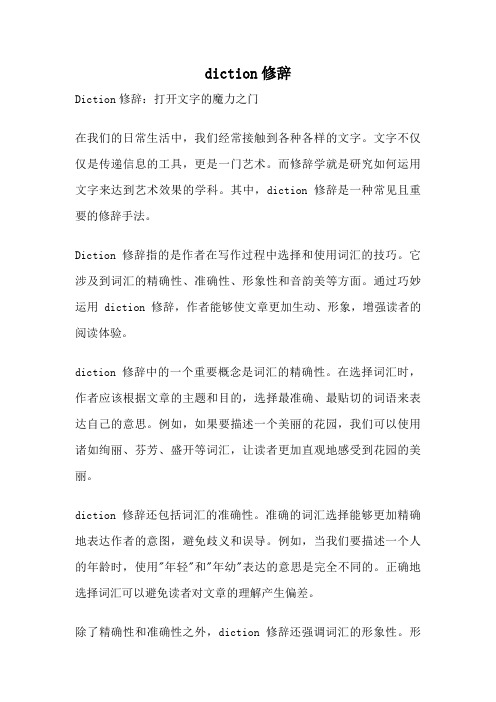
diction修辞Diction修辞:打开文字的魔力之门在我们的日常生活中,我们经常接触到各种各样的文字。
文字不仅仅是传递信息的工具,更是一门艺术。
而修辞学就是研究如何运用文字来达到艺术效果的学科。
其中,diction修辞是一种常见且重要的修辞手法。
Diction修辞指的是作者在写作过程中选择和使用词汇的技巧。
它涉及到词汇的精确性、准确性、形象性和音韵美等方面。
通过巧妙运用diction修辞,作者能够使文章更加生动、形象,增强读者的阅读体验。
diction修辞中的一个重要概念是词汇的精确性。
在选择词汇时,作者应该根据文章的主题和目的,选择最准确、最贴切的词语来表达自己的意思。
例如,如果要描述一个美丽的花园,我们可以使用诸如绚丽、芬芳、盛开等词汇,让读者更加直观地感受到花园的美丽。
diction修辞还包括词汇的准确性。
准确的词汇选择能够更加精确地表达作者的意图,避免歧义和误导。
例如,当我们要描述一个人的年龄时,使用"年轻"和"年幼"表达的意思是完全不同的。
正确地选择词汇可以避免读者对文章的理解产生偏差。
除了精确性和准确性之外,diction修辞还强调词汇的形象性。
形象的词汇能够让读者更加生动地感受到文章中描绘的场景和人物。
例如,用"翩翩起舞"来形容舞蹈会让读者感受到舞者轻盈飘逸的形象,增强了阅读的趣味性和可视化效果。
diction修辞还注重词汇的音韵美。
音韵美是指词汇在语音上的和谐和美感。
通过巧妙运用音韵方面的修辞手法,作者能够使文章更加优美、动听。
例如,使用押韵、排比、对偶等手法,可以使文章具有一种韵律感和节奏感,让读者产生一种愉悦的阅读感受。
diction修辞是一种重要的修辞手法,它能够让文章更加生动、形象,增强读者的阅读体验。
通过精确、准确、形象和音韵美的词汇选择,作者可以更好地表达自己的意图,使读者更加投入到文章的世界中。
因此,在写作过程中,我们应该注重diction修辞的运用,打开文字的魔力之门。
dic词缀的意思

dic词缀的意思
DIC是英文单词dictionary的缩写,具有词缀的含义。
该词缀通常用
于表示“字典”、“词典”的意思,例如:
1. dictionary(词典)
2. diction(措辞)
3. dictate(命令)
除此之外,DIC还可以表示“诊断”、“数字”、“直接”等含义,
具体如下:
1. diagnosis(诊断)
2. digital(数字的)
3. direct(直接的)
DIC这个词缀的历史由来可以追溯到拉丁语中的“dictio”(意为“说”)。
在英语中,“dic”被广泛应用于语言和数字领域。
例如,在计算机编程中,DIC常常用于表示“字典”或“映射”的概念。
此外,DIC也被广泛用于医学领域,用于表示与诊断和治疗相关的术语。
总之,DIC是一个用途广泛的词缀,可以表示不同的含义,涵盖了语
言、数字、医学等领域。
了解这个词缀的含义和用法,可帮助我们更好地理解相关单词的含义。
Diction (遣词用字)
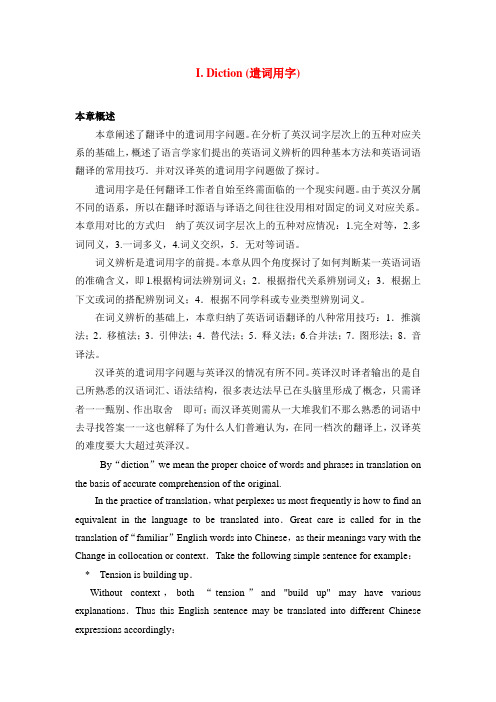
I. Diction (遣词用字)本章概述本章阐述了翻译中的遣词用字问题。
在分析了英汉词字层次上的五种对应关系的基础上,概述了语言学家们提出的英语词义辨析的四种基本方法和英语词语翻译的常用技巧.并对汉译英的遣词用字问题做了探讨。
遣词用字是任何翻译工作者自始至终需面临的一个现实问题。
由于英汉分属不同的语系,所以在翻译时源语与译语之间往往没用相对固定的词义对应关系。
本章用对比的方式归纳了英汉词字层次上的五种对应情况:1.完全对等,2.多词同义,3.一词多义,4.词义交织,5.无对等词语。
词义辨析是遣词用字的前提。
本章从四个角度探讨了如何判断某一英语词语的准确含义,即l.根据构词法辨别词义;2.根据指代关系辨别词义;3.根据上下文或词的搭配辨别词义;4.根据不同学科或专业类型辨别词义。
在词义辨析的基础上,本章归纳了英语词语翻译的八种常用技巧:1.推演法;2.移植法;3.引伸法;4.替代法;5.释义法;6.合并法;7.图形法;8.音译法。
汉译英的遣词用字问题与英译汉的情况有所不同。
英译汉时译者输出的是自己所熟悉的汉语词汇、语法结构,很多表达法早已在头脑里形成了概念,只需译者一一甄别、作出取舍即可;而汉译英则需从一大堆我们不那么熟悉的词语中去寻找答案一一这也解释了为什么人们普遍认为,在同一档次的翻译上,汉译英的难度要大大超过英泽汉。
By“diction”we mean the proper choice of words and phrases in translation on the basis of accurate comprehension of the original.In the practice of translation,what perplexes us most frequently is how to find an equivalent in the language to be translated into.Great care is called for in the translation of“familiar”English words into Chinese,as their meanings vary with the Change in collocation or context.Take the following simple sentence for example:* Tension is building up.Without context,both “tension”and "build up" may have various explanations.Thus this English sentence may be translated into different Chinese expressions accordingly:·形势紧张起来。
Diction
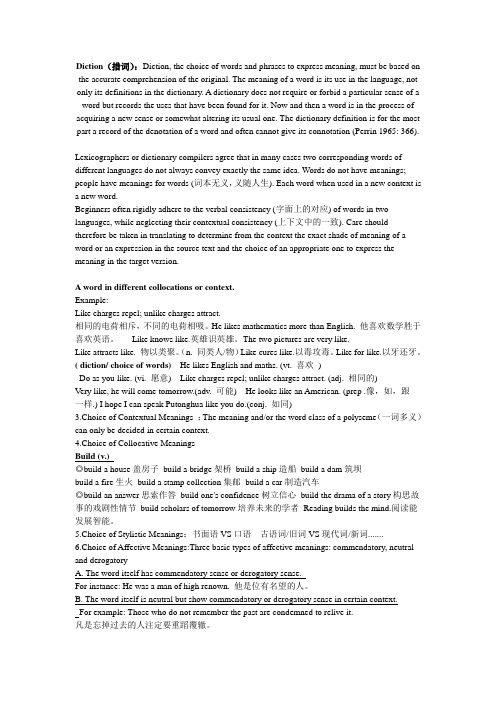
Diction(措词):Diction, the choice of words and phrases to express meaning, must be based on the accurate comprehension of the original. The meaning of a word is its use in the language, not only its definitions in the dictionary. A dictionary does not require or forbid a particular sense of a word but records the uses that have been found for it. Now and then a word is in the process of acquiring a new sense or somewhat altering its usual one. The dictionary definition is for the most part a record of the denotation of a word and often cannot give its connotation (Perrin 1965: 366).Lexicographers or dictionary compilers agree that in many cases two corresponding words of different languages do not always convey exactly the same idea. Words do not have meanings; people have meanings for words (词本无义,义随人生). Each word when used in a new context is a new word.Beginners often rigidly adhere to the verbal consistency (字面上的对应) of words in two languages, while neglecting their contextual consistency (上下文中的一致). Care should therefore be taken in translating to determine from the context the exact shade of meaning of a word or an expression in the source text and the choice of an appropriate one to express the meaning in the target version.A word in different collocations or context.Example:Like charges repel; unlike charges attract.相同的电荷相斥,不同的电荷相吸。
英汉互译2-diction

Unit 2 Diction (遣词用字)Some background information about this unit:a)No context, no text.b)What is context?Context, as the term suggests, refers to all the different situations involved in language communication.语境,就是产生语言活动的环境,包括时间、空间、语言交际参与者及语言活动的目的等,反映在文字材料中也称上下文。
语境是一切语言活动存在的前提。
Firth: each word when used in a new context is a new word.Some examples:▪I’ll finish the book next week.▪“我”是谁?finish的具体措辞究竟是:看完、写完、审完?▪Tension is building up.形式紧张起来。
/ 张力在增大。
/ 电压在增加。
/ 压力在增强。
/ 血压在增高。
/ 气压在加强。
/ 情绪越来越紧张。
/ 紧张局势在加剧。
Without context, both “tension” and “build up” may have various explanations.▪I’m through.通话完毕,结束了。
(AmE)电话接通了。
(BrE)1. Equivalence between English and Chinese at Word Level1.1 Word-for-word equivalenceThis is most shown in proper nouns and technical terms.▪Marxism 马克思主义▪Aspirin 阿司匹林▪Laser 激光▪Leukemia 白血病1.2 One word with multiple equivalents of the sameThis is a common case in translation.▪Wife: 妻子、老婆、夫人、老伴、媳妇、爱人、内人……▪Potato: 马铃薯、土豆、洋芋、山药蛋……▪人:human being, man, people, person…▪犬:dog, hound, spaniel, mastiff, pointer, setter, retriever, terrier…1.3 One word with several equivalents of different meaningsThis is also very common in translation.▪cousin: 堂兄、堂弟、堂姐、堂妹、表哥、表弟、表姐、表妹……▪president: 总统、主席、总裁、董事长、议长、会长、社长、校长……▪carry: 搬、运、送、提、拎、挑、担、抬、背、扛、抱、搂、举、端、夹、捧……▪走:walk, saunter, amble, stride, trudge, shamble, prance, scamper, clump, tiptoe.▪羊:sheep, goat, ram, ewe, lamb1.4 Equivalents interwoven with one another1.5 Words without corresponding equivalentsIn this case, an explanation is given instead of an equivalent.▪teenager: 13到19岁的青少年▪cyber slacker: 利用工作时间在公司上网、做与工作无关的事情的雇员▪阴:yin (in Chinese thought) the soft inactive female principle or force in the world▪阳:yang (in Chinese thought) the strong active male principle or force in the world2. Methods of discriminating the original meaning of a given word2.1 According to word formation▪parabiospheric: 外生物层的para- (outside), bio- (biologic), spheric (having the form of a phere)▪pneumonoultramicroscopicsilicovolcanokoniosis 肺尘病,硅酸盐沉着病pneumono (of lung) ultra (beyond) micro (very small)scopic (of viewing or observing) silico (of silicon) volcano (of volcano)coni (koni, of dust) osis (forming the name of a disease)2.2 According to the referenceIn many cases the meaning of a pronominal word may be judged from the references.▪He [father] sent John to the university and was eager to have him distinguish himself.他送约翰上大学,巴望儿子能出类拔萃。
diction
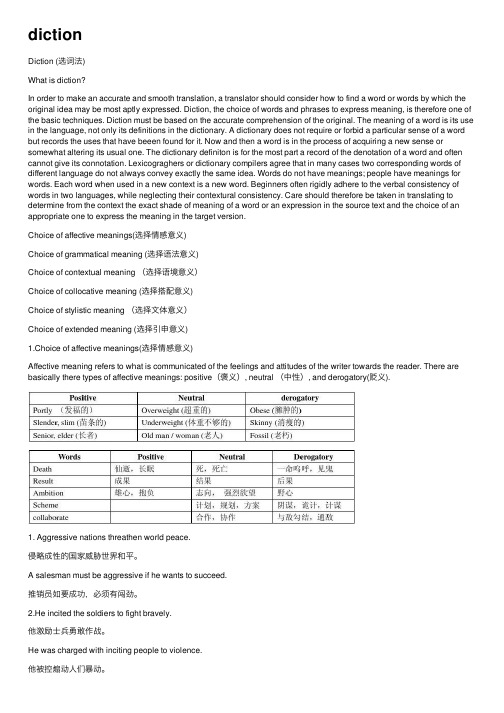
dictionDiction (选词法)What is diction?In order to make an accurate and smooth translation, a translator should consider how to find a word or words by which the original idea may be most aptly expressed. Diction, the choice of words and phrases to express meaning, is therefore one of the basic techniques. Diction must be based on the accurate comprehension of the original. The meaning of a word is its use in the language, not only its definitions in the dictionary. A dictionary does not require or forbid a particular sense of a word but records the uses that have beeen found for it. Now and then a word is in the process of acquiring a new sense or somewhat altering its usual one. The dictionary definiton is for the most part a record of the denotation of a word and often cannot give its connotation. Lexicograghers or dictionary compilers agree that in many cases two corresponding words of different language do not always convey exactly the same idea. Words do not have meanings; people have meanings for words. Each word when used in a new context is a new word. Beginners often rigidly adhere to the verbal consistency of words in two languages, while neglecting their contextural consistency. Care should therefore be taken in translating to determine from the context the exact shade of meaning of a word or an expression in the source text and the choice of an appropriate one to express the meaning in the target version.Choice of affective meanings(选择情感意义)Choice of grammatical meaning (选择语法意义)Choice of contextual meaning (选择语境意义)Choice of collocative meaning (选择搭配意义)Choice of stylistic meaning (选择⽂体意义)Choice of extended meaning (选择引申意义)1.Choice of affective meanings(选择情感意义)Affective meaning refers to what is communicated of the feelings and attitudes of the writer towards the reader. There are basically there types of affective meanings: positive(褒义), neutral (中性), and derogatory(贬义).1. Aggressive nations threathen world peace.侵略成性的国家威胁世界和平。
diction的名词解释
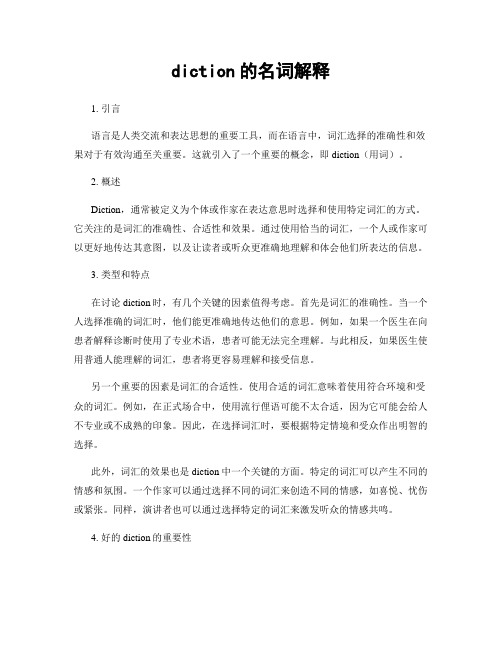
diction的名词解释1. 引言语言是人类交流和表达思想的重要工具,而在语言中,词汇选择的准确性和效果对于有效沟通至关重要。
这就引入了一个重要的概念,即diction(用词)。
2. 概述Diction,通常被定义为个体或作家在表达意思时选择和使用特定词汇的方式。
它关注的是词汇的准确性、合适性和效果。
通过使用恰当的词汇,一个人或作家可以更好地传达其意图,以及让读者或听众更准确地理解和体会他们所表达的信息。
3. 类型和特点在讨论diction时,有几个关键的因素值得考虑。
首先是词汇的准确性。
当一个人选择准确的词汇时,他们能更准确地传达他们的意思。
例如,如果一个医生在向患者解释诊断时使用了专业术语,患者可能无法完全理解。
与此相反,如果医生使用普通人能理解的词汇,患者将更容易理解和接受信息。
另一个重要的因素是词汇的合适性。
使用合适的词汇意味着使用符合环境和受众的词汇。
例如,在正式场合中,使用流行俚语可能不太合适,因为它可能会给人不专业或不成熟的印象。
因此,在选择词汇时,要根据特定情境和受众作出明智的选择。
此外,词汇的效果也是diction中一个关键的方面。
特定的词汇可以产生不同的情感和氛围。
一个作家可以通过选择不同的词汇来创造不同的情感,如喜悦、忧伤或紧张。
同样,演讲者也可以通过选择特定的词汇来激发听众的情感共鸣。
4. 好的diction的重要性一个好的diction是有效沟通的基础。
通过选择准确、合适和有力的词汇,一个人可以确保自己的意思能够准确地被传达和理解。
好的diction还有助于建立信任和引起共鸣。
当读者或听众感到词汇选择符合他们的需求和理解时,他们更有可能被激发兴趣并与作者建立联系。
5. diction的应用领域不同的领域和专业都有自己特定的diction。
例如,在文学和诗歌中,diction非常重要,因为它可以创造出独特的文学风格和情感。
在演讲中,演讲者的词汇选择可以影响他们的口才和演讲的说服力。
英语写作中的十大常见错误
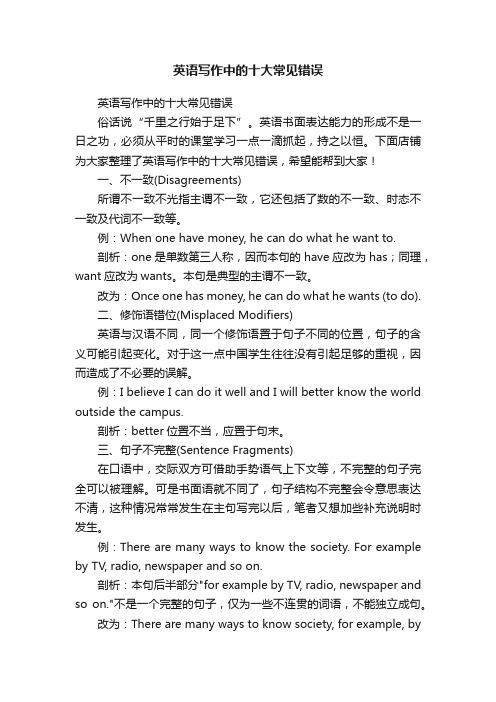
英语写作中的十大常见错误英语写作中的十大常见错误俗话说“千里之行始于足下”。
英语书面表达能力的形成不是一日之功,必须从平时的课堂学习一点一滴抓起,持之以恒。
下面店铺为大家整理了英语写作中的十大常见错误,希望能帮到大家!一、不一致(Disagreements)所谓不一致不光指主谓不一致,它还包括了数的不一致、时态不一致及代词不一致等。
例:When one have money, he can do what he want to.剖析:one是单数第三人称,因而本句的have应改为has;同理,want应改为wants。
本句是典型的主谓不一致。
改为:Once one has money, he can do what he wants (to do).二、修饰语错位(Misplaced Modifiers)英语与汉语不同,同一个修饰语置于句子不同的位置,句子的含义可能引起变化。
对于这一点中国学生往往没有引起足够的重视,因而造成了不必要的误解。
例:I believe I can do it well and I will better know the world outside the campus.剖析:better位置不当,应置于句末。
三、句子不完整(Sentence Fragments)在口语中,交际双方可借助手势语气上下文等,不完整的句子完全可以被理解。
可是书面语就不同了,句子结构不完整会令意思表达不清,这种情况常常发生在主句写完以后,笔者又想加些补充说明时发生。
例:There are many ways to know the society. For example by TV, radio, newspaper and so on.剖析:本句后半部分"for example by TV, radio, newspaper and so on."不是一个完整的句子,仅为一些不连贯的词语,不能独立成句。
Unit3 翻译的用词Diction.
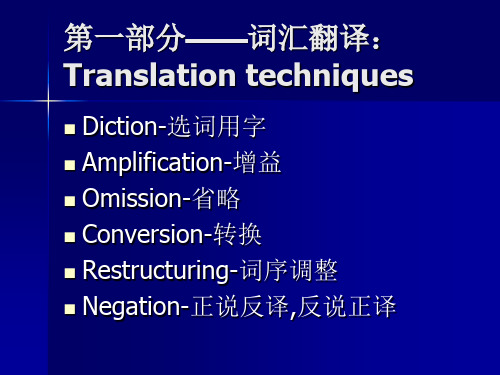
Chinese. Useful skills. Exercises.
Have a try
1. He likes mathematics more than physics. 2. There are fine grains of dust shining like gold. 3. Like knows like. 4. Like father like son. 5. Like charges repel; unlike charges attract. (喜欢, 像, 英雄, 相同的)
2. Delicate: - skin; - porcelain; - upbringing; - health; - vase; - diplomatic question; - sense of smell;-instrument; speech
3. Soft: - pillow; - money; - breeze; - voice; - hat; - answer; - heart; - drink; - light;
Exercise 3
1. 你是什么意思? 2. 我的意思还是不去为好。 3. 天有点要下雨的意思。 4. 跳舞很有意思。 5. 他这个人有意思。 6. 她的话真没意思。 7. 这是我们的一点小意思。 8. 这个女生对她的英语老师有了意思。 9. 他的讲话虽然简短但是非常有意思。 10. 我没有要改变主意的意思。
第一部分——词汇翻译: Translation techniques
Diction-选词用字 Amplification-增益 Omission-省略 Conversion-转换 Restructuring-词序调整 Negation-正说反译,反说正译
dicate词根词缀

一.dicate词根词缀dict, dic= to say, to assert 说;断言abdicate v.放弃;退位ab 去掉+ dic 说;断言+ ate 做,造成,使… → 失去发言权→ 退位addict v.沉溺,上瘾ad 加强+ dict 说;断言→ 说了又说→ 上瘾benediction n.祝福bene 好+ dict 说;断言+ ion 表动作→ 说好话→ 祝福contradict v.反驳;否认contra 相反+ dict 说;断言→ 说反对的话→ 反驳contradictory adj.矛盾的,对立的contradict 反驳+ ory …的→ 矛盾的,对立的dictate v.口授;命令dict 说;断言+ ate 做,造成,使… → 说话→ 口授dictator n.发命令者;独裁者dictate的名词diction n.措辞dict 说;断言+ ion 表名词→ 说的话→ 措辞dictionary n.字典diction 措辞+ ary 物→ 含有措辞的物→ 字典edict n.法令;布告e 出+ dict 说;断言→ 说出〔要求〕→ 法令;布告indicate v.指示;表示in 加以… + dic 说;断言+ ate 做,造成,使… → 说出→ 指示indict v.起诉,控告in 进入+ dict 说;断言→ 进〔法院〕讨个说法→ 起诉interdict n.禁令inter 相互+ dict 说;断言→ 相互说〔不让做〕→ 禁令jurisdiction n.司法权juris 法律+ dict 说;断言+ ion 表名词→ 法律的说法→ 司法权malediction n.恶言;诅咒male〔= mal 坏〕+ dict 说;断言+ ion 表名词→ 说坏话→ 恶言predicate v.断定,认定pre 预先+ dic 说;断言+ ate 做,造成,使… → 预先断言→ 断定predict v.预言;预告pre 前;预先+ dict 说;断言→ 预言;预告verdict n.裁判,判决ver 真实+ dict 说;断言→ 说真话→ 裁决。
专四英语diction听力流程

专四英语diction听力流程English: In the listening section of the CET-4 exam, diction refers to the pronunciation, enunciation, and emphasis of words. It is essential for test-takers to have a clear understanding of the context and tone of the conversation in order to accurately interpret the speaker's diction. By actively listening to the nuances in the speaker's voice, intonations, and stress patterns, test-takers can better grasp the meaning behind each word and phrase. Additionally, being attunedto the speaker's pacing and pauses can also provide valuable insight into the overall message being conveyed. Developing strong diction skills not only improves one's listening comprehension but also enhances overall communication abilities in English.中文翻译: 在专四考试的听力部分,diction指的是单词的发音、发声和重音。
考生必须清楚地理解对话的背景和语气,才能准确地解读说话者的diction。
Diction

6
My Advice to Undergraduates
1. To avoid this dilemma, I have some advice to the undergraduates. 2. (1) First, study as hard as you can. (2) Second, get a part-time job which is related to the job you want to get in the future. 3. If the undergraduates prepare themselves well for the job-hunting, they will have more chances to find a good job after graduation.
one sentence a day
1
2
remove the barrier for
Machine translation has removed the barrier for communication between people who do not share the same language.
7
Because of the severe competition in the job market, it's quite difficult to get a decent job for a college graduate. Many college students complain that graduation means the coming of unemployment. To avoid this d ile m m a, I ha ve som e adv ic e to th e undergraduates.
Diction
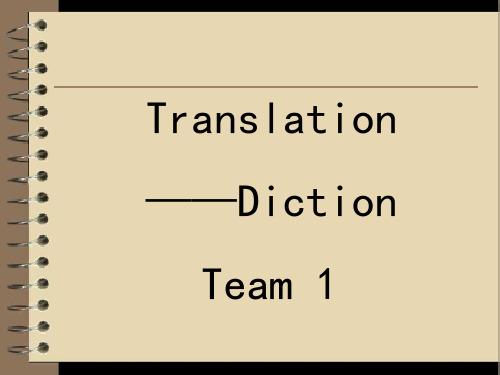
charge
• She complained that she had been charged too much. 她抱怨说,向她收的费太高了。
• This store will charge things you buy, and let you pay for them later. 这家商店将你所买的东西记入账内,让你 以后付款。
Translation
——Diction
Team 1
We Do Chicken Right.
我们做鸡是对的。 adj.对的
我们只做鸡的右半边。 adj.右边的, 右方的
我们可以做鸡,对吧。 prep. (要确保对方同意 或明白时说)对不 我们直接做鸡。 adv.直接地
Definition of Diction
the proper choice of words and phrases in translation on the basis of accurate comprehension of the origin
charge
• This general was charged with treason. 这个将军被指控犯了叛国罪。 • The Committee decided to put Professor Henry in charge of the research work. 委员会决定让亨利教授负责这项工作。
(英汉词字层次对等关系)
Word-for-Word Correspondence
• aspirin = 阿斯匹林 • 激光= laser
One Word with Multiple Equivalents of the Same Meaning
研究生实用英语写作2-diction
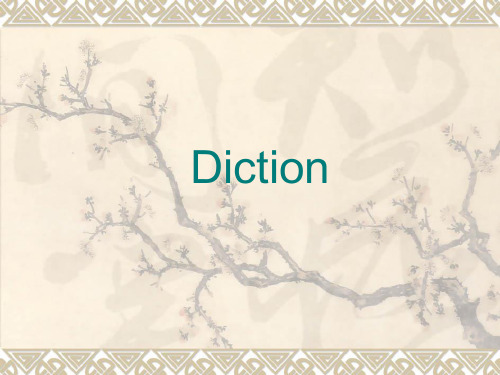
❖ Accuracy and exactness
Many errors in writing result from the confusion of word meanings. For example:
1. When he was only 10 years old, he won first reward.
2. They can not find an outlet for fleeing the burning room.
3. Tom shed regretful tears.
4. He derives delight (sensuous delight) from folk music.
Another example:
1. White elephant sports shoes 2. Yellow publications 3. He’s as quiet as a cat. 4. He’s as strong as a cow.
❖ White elephant sports shoes something expensive and not useful/practical
In selecting the most appropriate words, we should put the following 5 criteria in mind: ❖ Accuracy and exactness ❖ Culture awareness ❖ Emotion awareness ❖ Occasion awareness ❖ Abundance and diversity
词带有更多的感情。
•First lady •first wife
英语词源漫谈中dictionary
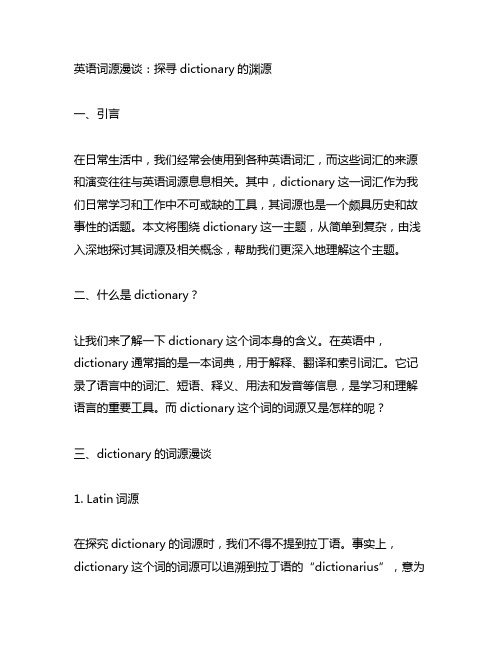
英语词源漫谈:探寻dictionary的渊源一、引言在日常生活中,我们经常会使用到各种英语词汇,而这些词汇的来源和演变往往与英语词源息息相关。
其中,dictionary这一词汇作为我们日常学习和工作中不可或缺的工具,其词源也是一个颇具历史和故事性的话题。
本文将围绕dictionary这一主题,从简单到复杂,由浅入深地探讨其词源及相关概念,帮助我们更深入地理解这个主题。
二、什么是dictionary?让我们来了解一下dictionary这个词本身的含义。
在英语中,dictionary通常指的是一本词典,用于解释、翻译和索引词汇。
它记录了语言中的词汇、短语、释义、用法和发音等信息,是学习和理解语言的重要工具。
而dictionary这个词的词源又是怎样的呢?三、dictionary的词源漫谈1. Latin词源在探究dictionary的词源时,我们不得不提到拉丁语。
事实上,dictionary这个词的词源可以追溯到拉丁语的“dictionarius”,意为“字典”或“词典”。
这个词源展现了古罗马人对于语言和文字记录的重视,同时也反映了古代文明中对于知识和学问的珍视。
2. 中世纪演变随着时间的推移,dictionary这一词汇在中世纪逐渐演变成了中世纪拉丁语中的“dictionarium”或“dictionarius”。
在中世纪,这些词典开始被用于宗教、学术和文学领域,成为当时知识传承和交流的重要工具。
3. 英语语境随着时代的变迁,dictionary这一词汇进入了英语语境,并逐渐成为今天我们所使用的形式,“dictionary”。
在英语中,这个词汇不仅仅指代传统的词典,还包括了各种形式的语言工具,如电子词典、在线词典等。
它的词源经历了千年,但仍保留着对知识和语言的珍视和传承。
四、总结与回顾通过对dictionary这一词汇词源的解析,我们不仅仅了解了它的历史渊源,还能感受到人类对于知识和语言的不懈探索和传承。
dict后缀的单词 -回复

dict后缀的单词-回复什么是后缀?后缀是一种附加在单词末尾的字母或一组字母,用来改变单词的词性、形态、意义或语法功能。
在英语中,后缀通常可以识别特定的词类或单词的语法结构。
常见的后缀有很多种,它们可以用于名词、动词、形容词和副词等不同的词类,并且可以为单词带来新的意义和用法。
下面我将逐步介绍一些常见的以"[dict]"为后缀的单词后缀,并解释它们的用法和意义。
一、"-dict"后缀"-dict"是一个常见的名词后缀,它起源于拉丁语中的"dictus",意为"说"或"宣布"。
通过加上这个后缀,原本的词变成了一个表示行为或状态的名词。
举个例子,我们可以看到"verdict"这个单词。
其中,"ver-"表示"真实"或"真理",而"-dict"则表示"宣布"。
因此,"verdict"的意思就是"宣布真理"或"判决"。
类似的单词还有"benedict"(祝福)、"contradict"(反驳)和"predict"(预测)等。
二、"-edict"后缀"-edict"是一个动词后缀,它起源于拉丁语中的"edictum",意为"宣布"或"命令"。
这个后缀通常用于表示官方或权威的颁布或宣布。
一个经典的例子是"dictate"(口述、指令)。
当我们把这个词加上"-edict"后缀时,就得到了"edictate",意为"官方宣布"或"命令"。
汉译英翻译技巧
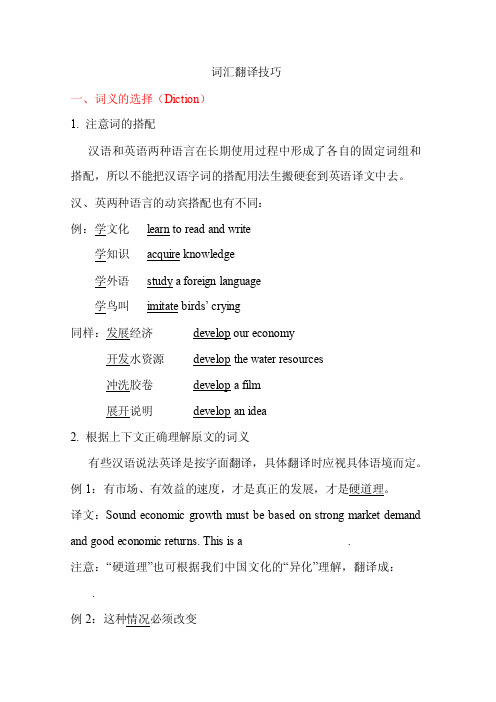
词汇翻译技巧一、词义的选择(Diction)1. 注意词的搭配汉语和英语两种语言在长期使用过程中形成了各自的固定词组和搭配,所以不能把汉语字词的搭配用法生搬硬套到英语译文中去。
汉、英两种语言的动宾搭配也有不同:例:学文化learn to read and write学知识acquire knowledge学外语study a foreign language学鸟叫imitate birds’ crying同样:发展经济develop our economy开发水资源develop the water resources冲洗胶卷develop a film展开说明develop an idea2. 根据上下文正确理解原文的词义有些汉语说法英译是按字面翻译,具体翻译时应视具体语境而定。
例1:有市场、有效益的速度,才是真正的发展,才是硬道理。
译文:Sound economic growth must be based on strong market demand and good economic returns. This is a .注意:“硬道理”也可根据我们中国文化的“异化”理解,翻译成:.例2:这种情况必须改变译文:This must change.分析:此处要正确理解原文的词义。
汉语措辞中的“情况”一词的基本意义与英语中的circumstance, situation, condition等词相近,但是究竟怎样翻译,还需要根据上下文来决定。
二、词的增补(Amplification)词的增补又常叫增译/增词法,是为使译文准确、通顺、达意。
增译有语义性增译修辞性增译,还有注释性增译(文内阐释或文中夹注)1.增补主语汉语中无主语的句子很多,汉译英时要根据上下文的意思选择适当的代词或名词补做主语。
增加什么主语取决于上下文。
例1:知己知彼,百战不殆译:2. 增补非人称的或强调句中的itit可以指天气、时间,还常用来表示强调、代替不定式等。
翻译技巧1-diction培训讲学
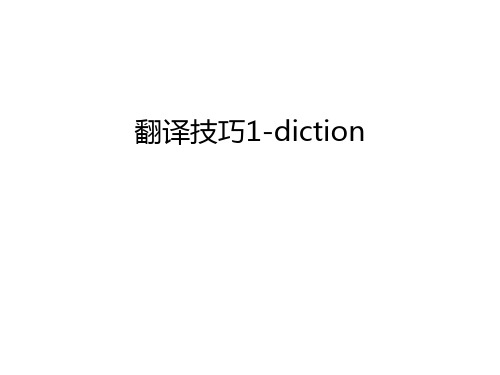
Delicate difference
讲不大清楚的差别
Delicate surgical operation 难做的外科手术
……
3) Distinguish the original meaning of an
English word by means of syntax(从词的语 法形式判断)
7. 王教授精通小学和《大学》
8. 毛泽东同志的思想和学说是永存的;
关于社会注意建设总路线的基本思想;
破除迷信,解放思想;
毛泽东军事思想的一个重要组成部分,是关于人民 战争的思想;
政治问题和思想问题。
1. 广播学校(通过电台对各地的学生授课的学校) 误:空军学校 2. 昨晚我去参加了我们中国研究组的集会。 (do: n. social function 集会,娱乐宴聚活动)误:
machine, engine, plane, aircraft...机 sheep, goat, ram, ewe, lamb...羊
4) Equivalents Interwoven with One Another
Say
说
Speak
讲
Talk
谈
Tell
诉
这可说不得。 我代他向你说
Warming-up exercises:
1. The School of the Air (the school of the air)
2. Last evening I went to a do held by our China Study Group.
3. The see of Sydney
1) Distinguish the original meaning of an English word by means of context
巧记dictionary英语单词

巧记dictionary英语单词
大家好,今天我要教大家一些关于dictionary这个单词的用法和记忆技巧。
Dictionary是英语中最基础的单词之一,它具有“词典”、“字典”的意思,可以用于描述各种类型的参考书。
下面给大家列举一些常用的记忆技巧,帮助大家更好地掌握这个单词:
1. 拆解记忆法:将dictionary拆成“diction”和“ary”两部分,其中“diction”的意思是“措辞”,“ary”表示“关于”的意思。
可以从这两个部分的含义来记忆单词的意思。
2. 联想记忆法:将dictionary想象成一本厚厚的书,里面记载了许多单词的含义和用法。
我们可以通过想象自己在使用这本书来加深记忆。
3. 语境记忆法:将dictionary放在句子中,例如:“我需要一本英语词典来学习英语。
”这样可以让我们更容易地理解单词的含义。
希望以上的记忆技巧能够帮助大家更好地学习和记忆单词dictionary。
祝大家学习愉快!
- 1 -。
- 1、下载文档前请自行甄别文档内容的完整性,平台不提供额外的编辑、内容补充、找答案等附加服务。
- 2、"仅部分预览"的文档,不可在线预览部分如存在完整性等问题,可反馈申请退款(可完整预览的文档不适用该条件!)。
- 3、如文档侵犯您的权益,请联系客服反馈,我们会尽快为您处理(人工客服工作时间:9:00-18:30)。
begin
sufficient
enough
The Fox and the Crow
One day a crow stole a piece of cheese from a woman's kitchen and flew with it to a tree. A fox who was very hungry saw the crow. He said to the crow, "You have a beautiful voice.Won't you sing for me?"The crow was very pleased by the compliment. As he opened his mouth to sing, the piece of cheese fell to the ground. The fox snatched the cheese and ran away.
public servant / bureaucrat / government employee law officer / cop / policeman small / little
3.General &Specific Words
General
Animal Laugh Scientist
The English language is formed with three kinds of words: formal, informal, and colloquial.
Formal
Informal
Colloquial
automobile
comprehend depart residence offensive exhausted dejected
Informal words
• Informal words: from old English; being used in everyday conversation and in informal writing like personal letters,diaries and stories. • Informal words are good for all kinds of writing
4.Why
is it that every time I have a hot date , I break out with a big zit on my face? 5.Let me spring for dinner! 6.Peter’s vacation plans went up in smoke when a crisis arose in the office.
Good Food A good man
When we describe or explain things, or when we give details, we should try to use specific or concrete words wherever possible, for they are vivid, exact and interesting; when summarize or generalize, we may find general or abstract wmeaning of words denotation & connotation (原义与涵义)
• Denotation is a word's direct, literal meaning. • Connotation is the word's implied, suggested meaning.Connotation can be classified into favorable, unfavorable and neutral. • Words may have similar denotations but differ widely in connotation.
—The Right word at the Right Time
Outline:
1.Level of words 2.The meaning of words denotation & connotation (原 义与涵义) 3.General &Specific Words
1.Level of words
After all that work, I'm really dead. A: I'm granted a full scholarship for this semester. B: Congratulations. That's something. I'm broke. I' m not going to kid you. Do you really mean it? I am behind you.
Slang:
1.I have to go to the john. Wait for me
in the car. 2.Don’t try to push me around. 3.Keep your shirt on. He didn’t mean to offend you. That’s just the way he talks.
Formal Informal Formal Informal
alternative
accomplish
choice
finish
converse
inform
talk
tell
appropriate
fabricate
proper
make
appreciate
location
like
place
commence
Specific
tiger, horse, fox, cat, mouse, bird, butterfly, insect giggle, smile, grin, beam,guffaw physicist, chemist, biologist, astronomer, geologist tasty, delicious, nourishing, rich, wholesome, fresh, appetizing, kind, honest, just, generous, sympathetic, warm-hearted, selfless, brave, honorable
Formal words
In formal writing: formal words,learned words, or literary words(书面词或文言词), or big words (e.g. scholarly magazines and books,documents, research papers,and formal lectures and addresses.)
example: Jack went to the window and looked at the crowd outside. Jack tiptoed to the window and peeped at the crowd outside.
General:He has a big house. Specific:He has a two-storied house with four bedrooms, two living-rooms , a dining-room and a kitchen.
Diction
Using the right word at the right time is rather like wearing appropriate clothing for the occasion: it is a courtesy to others, and a favor to yourself —a matter of presenting yourself well in the eyes of the world.
In area China is the third largest country in the world. The modernization program has won the support of the whole nation . state organs; state -owned enterprises China is my native land.
1.Many formal words contain three or more than three syllables;most of them are commonly of French,Greek and Latin origin. 2.Formal words are seldom used in informal writing.
Features of informal words:
Frequently used New words formed Many meanings
各类常用名词:自然现象、人体部 分、动物名称、食物名称、亲属关系 词。 生活和思想的基本行动的动词。 基本性质的形容词。
Contrast pairs of formal and informal words that have similar denotations
Main characteristics of formal usage
No contractions (do not, instead of don't; he will , instead of he' ll) No slang and hesitation fillers(er, um, well,you know) No sentence fragments In a serious or neutral tone
